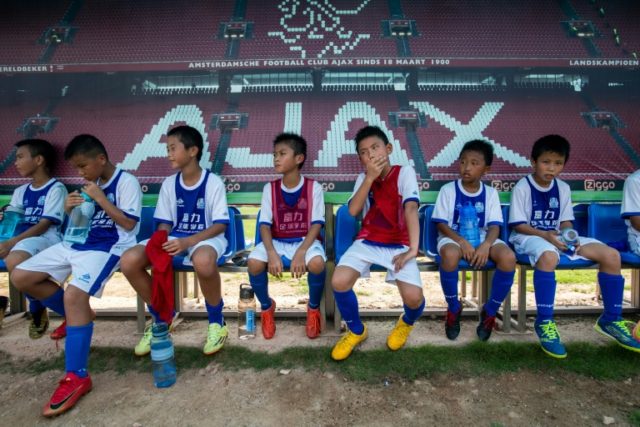Meizhou (China) (AFP) – “You let Glasgow score, what were you thinking?” plays a video, as a class of budding Chinese footballers stare at a large screen, their backs ramrod straight and arms folded neatly on their desks.
This is the daily lesson in football English at the youth academy of mid-table Chinese Super League (CSL) side Guangzhou R&F.
Among these 11-year-old boys could be a Chinese Johan Cruyff.
That may sound unlikely, but Dutch giants Ajax have teamed up with R&F and together vowed to build the best football academy in China.
Guangzhou R&F are not even the most famous football club in their own city — that is seven-time CSL champions Guangzhou Evergrande.
But under coach Dragan Stojkovic, a legendary playmaker with the former Yugoslavia, they want to play “the most beautiful football in China”.
And while real estate developer R&F have the deep pockets to shell out on expensive foreign players, they want to focus on youth, in line with Chinese government policy.
That is where Ajax — renowned for developing the likes of Cruyff, Marco van Basten, Dennis Bergkamp, Patrick Kluivert and many others — come in.
– Back to basics –
“It’s a long-term commitment we made with R&F of five years, but maybe we will need a couple more years because we have to start with the basics,” said Ed Engelkes, technical director of R&F Academy.
“When the fundamentals are not good, you have to start all over.”
The deal between Guangzhou R&F and Ajax was announced last November, but Engelkes and the three other coaches from the Dutch club are still getting their feet under the table.
The academy is in Meizhou, a sleepy city 400 kilometres (250 miles) from Guangzhou in the southern province of Guangdong and known for producing a number of Chinese players.
The academy has about 330 boys aged eight to 17 and they live on the site, training and having school lessons.
The best boys come on a scholarship while the others pay.
Many are local, but those from farther afield may see their parents just once or twice a year.
“That’s quite a commitment to make,” the 54-year-old Engelkes said, as youngsters fan out across the academy’s pitches.
– Language lessons –
Training is no-nonsense and sessions are captured on video for later scrutiny.
One coach occasionally stops a match between 10-year-olds to bark instructions in English, which are then translated.
Patience is needed, Engelkes admits, especially because of language differences.
With the midday sun burning down — it is fiercely hot even in autumn — the boys then troop inside for a quick shower and their lesson in football English.
R&F say that they are the only Chinese club with such a class, although it is questionable how much of the video the well-drilled boys understand.
After a healthy canteen lunch of seafood, rice, salad and fruit, the trainees retreat to their dormitory rooms for a nap. Mobile phones are only allowed on Saturday.
Sam, an 11-year-old striker from China’s far-western Xinjiang region, returns home just once a term.
His favourite player is Juventus striker Cristiano Ronaldo.
“He’s very good at controlling the ball and scoring,” Sam said.
Other European clubs are striking similar partnerships or setting up football schools in China, though few can rival Ajax’s reputation for youth development.
Engelkes wants to replicate in Meizhou the structure at Ajax HQ that has been so successful down the decades.
That goes as far as the interior of the academy offices — minus carpets, which are not practical in humid southern China.
“It’s very important that an Ajax player — and an R&F player — has a certain attitude,” said Engelkes, who previously coached Ajax women’s team.
“They must be creative. We want to think very attacking, attractive (football), taking initiative, but also be dominant in the game they play.”
It’s a bold blueprint in a country that has never produced a world-class player and does not share the deep-rooted Dutch football culture.
– ‘Think for themselves’ –
Engelkes said one particular challenge is that Chinese children — due partly to a rote-learning education system — are used to being told what to do.
“They don’t think for themselves… but if you are in the game, you need to make your own decisions,” he said.
On a more rudimentary level, there has been a problem with local staff smoking on the site.
The end game is to produce players for Guangzhou R&F’s first team and the Chinese national squad, while also training Chinese coaches to carry on the project after the Dutch leave.
So what do Ajax get out of this?
They receive an annual fee and when the multimillion-euro agreement was announced Edwin van der Sar, the Dutch former international goalkeeper who is now a senior Ajax official, spoke about growing the club’s brand in Asia.
But he and Engelkes stress that football is the prime motivation.
“You have to extend and share your knowledge, and maybe (in return) that will bring us other things,” said Engelkes.
For example, Ajax will be in prime position to snare any particularly talented local players or coaches.
So will a Chinese Cruyff, Bergkamp or Kluivert roll off the production line one day?
“Why not? It’s a big country so there must be talent here,” said Engelkes.

COMMENTS
Please let us know if you're having issues with commenting.